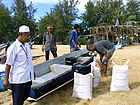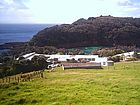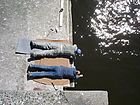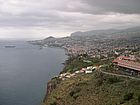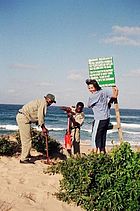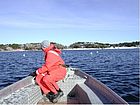GAME Partnerinstitute/Netzwerk
- 38 wissenschaftliche Partner in 28 Ländern -
-----------------------------------------------------------------------------------------------------------------------------------

Kenya
Institute: Kenya Marine Fisheries Research Institute, Mombasa
Local tutor: Professor Dr. J. M. Kanzungu
Participation: GAME 2003
Last update: March 2022
Mombasa, with a population of 900,000 Kenya’s second largest city, is marked by one of east Africa’s most important deep-water ports and also by gorgeous beaches. Its distance to the equator is about 280 miles.
...................................................................................................................................

Malaysia
1. Institute: Kolej Universiti Sains Dan Teknologi Malaysia (KUSTEM), Kuala Terengganu
Local tutors: Professor Dr. Liew Hock Chark, Dr. Zaleeha Kassim
Participation: GAME 2005, 2006, 2007
One of the few GAME study sites in the tropics. Kuala Terengganu is situated at the eastern coast of the Malacca peninsula in the South China Sea about 190 miles north of Kuala Lumpur. Sandy beaches and coral reefs are characterising the shore.
2. Institute: The Centre for Marine and Coastal studies (CEMACS)
Local tutors: Professor Dato´ Dr. Aileen Tan Shau Hwai
Participation: GAME 2020, 2021, 2022
CEMACS is located at Teluk Aling the northwest coast of Penang Island in the Penang National Park. The centre is served by a number of core academics working in collaboration with research associates identified from other teaching schools as well as from outside the University.
Last update: March 2022

Mexico
Institute: Instituto Ciencas del Mar y Limnologia in Puerto Morelos
Local tutors: Professor Dr. Vivianne Solis-Weiss
Participation: GAME 2013, 2014
Last update: March 2022
The Instituto de Ciencias del Mar y Limnología (Institute of Marine Sciences and Limnology) belongs to the Universidad Nacional Autónoma de México (Autonomous National University of Mexico: UNAM). UNAM is the largest university of Latin America and the oldest on the continent. The institute in Puerto Morelos on the Yucatan peninsula is quite small and the 14 researchers, the students and visiting scientists, who work here, create a familiar atmosphere right next to the ocean front.
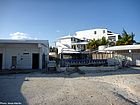
.................................................................................................................

New Zealand
Institute: Leigh Marine Laboratory, University of Auckland, Leigh
Local tutor: Dr. Mark Costello
Participation: GAME 2005, 2006, 2007, 2008, 2009
Last update: March 2022
The study sites are located in the northern part of New Zealand, approximately 50 miles north of Auckland, where the Leigh Marine Laboratory borders the Goat Island Marine Reserve. It provides superior working possibilities and an experimental basin which is directly connected to the sea over a pump system. GAME sea water experiments take place in the near-by Leigh.

Poland
Institute: Uniwersytet Gdanski, Gdynia and Gdansk
Local tutors: Professor Dr. Anna Szianawska
Participation: GAME 2006
Last update: March 2022
Besides Tvärminne (Finland) the Polish cities Gdynia and Gdansk were two other GAME study sites on the Baltic Sea, which, as a brackish system, provides particular ecological conditions.

Portugal
- Institute: Universidade do Algarve, Faro
Local tutor: Dr. Martin Sprunge & Dr. Ester Serrao
Participation: GAME 2003
Faro is a city and municipality in southern Portugal. It is the seat of the district of Faro and capital of the Algarve region. The University of the Algarve (Universidade do Algarve) was founded in 1979; it is particularly well-known for its marine biology, fisheries and oceanography courses, offered by its Marine and Environmental Sciences Faculty.
- Institute: Universidade da Madeira, Funchal on Madeira
Local tutor: Dr. Manfred Kaufmann (2003-2008), Dr. Joao Canning-Clode (since 2013)
Participation: GAME 2004, 2005, 2006, 2007, 2008, 2013, 2014, 2015, 2016, 2017, 2018, 2019, 2021
Far away from the African coastline, the sheltered bays of Madeira Island provide interesting study sites for the GAME experiments. The sea water here is very oligotrophic, such that many bigger fouling community organisms, esp. molluscs, are missing. Consequently, aufwuchs-communities are dominated by algae.
- Institute: Universidade de Lisboa, Lisbon
Local tutor: Dr. Joao Canning-Clode
Participation: GAME 2012
The marine-biological Lab of the University of Lisbon is located rigth at the rocky shore of Guia-Cascais.
Last update: March 2022

South Africa
- Institute: Rhodes University, Grahamstown
Local tutor: Professor Dr. Christopher McQuaid
Participation: GAME 2003
Grahamstown is about 30 miles away from the Indian Ocean.
- Institute: University of Capetown, Capetown
Local tutor: Professor Dr. George Branch, Dr. Maya C. Pfaff
Participation: GAME 2004, 2019, 2020
In the very north-east of South Africa, in KwaZulu-Natal, close to the border to Mozambique, the two study sites “Mabibi” and “Lala-Nek” are found. Biogeographically, Maputaland shores belong to the tropical (warm and oligotrophic) Indo-West Pacific region. The beaches here are segmented by protruding rock points on two of which, in the intertidal zone, the experiments took place.
Last update: March 2022

South Korea
Institute: Sungkyunkwan University, Suwon
Local tutor: Professor Dr. Jeong Ha Kim
Participation: GAME 2004
Last update: March 2022
The city of Suwon is located about 30 miles south of Seoul near the Yellow Sea coast.
...................................................................................................................................

Sweden
Institute: Sven Lovén Centre for Marine Sciences, University of Gothenburg, Tjärnö
Local tutor: Dr. Henrik Pavia
Participation: GAME 2003, 2004
Last update: March 2022
Situated on the Swedish west coast the University of Gothenburg maintains a well equipped station with numerous research opportunities, among them, e.g. a big and regulatable mesocosm facility which can serve to simulate future climate scenarios. Also part of the Lovén Centre is a biological field station on the island of Tjärnö. The Centre is a member of the European Association of Marine Biological Laboratories. At this site GAME projects were tutored by Dr Henrik Pavia.
...................................................................................................................................


